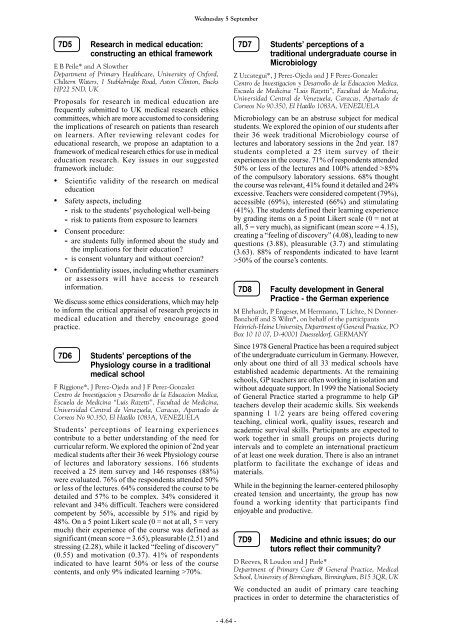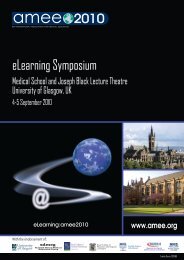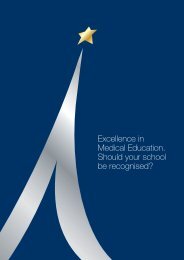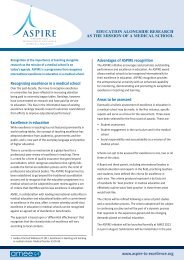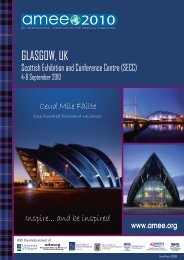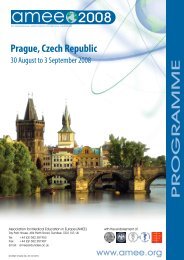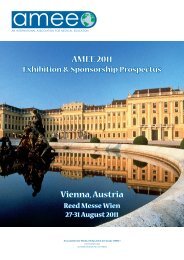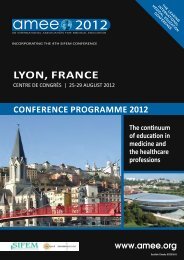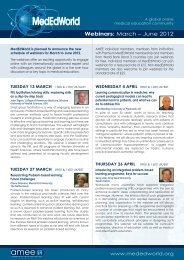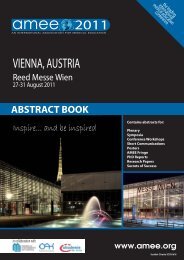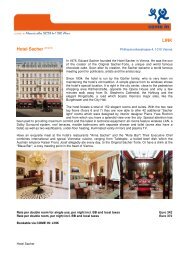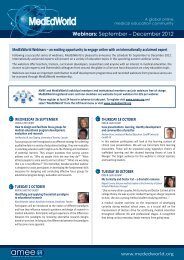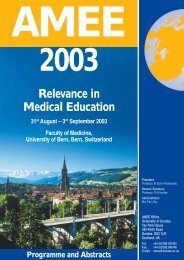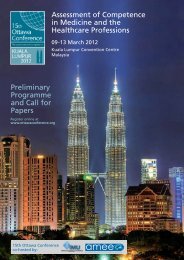AMEE Berlin 2002 Programme
AMEE Berlin 2002 Programme
AMEE Berlin 2002 Programme
You also want an ePaper? Increase the reach of your titles
YUMPU automatically turns print PDFs into web optimized ePapers that Google loves.
7D5 Research in medical education:<br />
constructing an ethical framework<br />
E B Peile* and A Slowther<br />
Department of Primary Healthcare, University of Oxford,<br />
Chiltern Waters, 1 Stablebridge Road, Aston Clinton, Bucks<br />
HP22 5ND, UK<br />
Proposals for research in medical education are<br />
frequently submitted to UK medical research ethics<br />
committees, which are more accustomed to considering<br />
the implications of research on patients than research<br />
on learners. After reviewing relevant codes for<br />
educational research, we propose an adaptation to a<br />
framework of medical research ethics for use in medical<br />
education research. Key issues in our suggested<br />
framework include:<br />
• Scientific validity of the research on medical<br />
education<br />
• Safety aspects, including<br />
- risk to the students’ psychological well-being<br />
- risk to patients from exposure to learners<br />
• Consent procedure:<br />
- are students fully informed about the study and<br />
the implications for their education?<br />
- is consent voluntary and without coercion?<br />
• Confidentiality issues, including whether examiners<br />
or assessors will have access to research<br />
information.<br />
We discuss some ethics considerations, which may help<br />
to inform the critical appraisal of research projects in<br />
medical education and thereby encourage good<br />
practice.<br />
7D6 Students’ perceptions of the<br />
Physiology course in a traditional<br />
medical school<br />
F Riggione*, J Perez-Ojeda and J F Perez-Gonzalez<br />
Centro de Investigacion y Desarrollo de la Educacion Medica,<br />
Escuela de Medicina “Luis Razetti”, Facultad de Medicina,<br />
Universidad Central de Venezuela, Caracas, Apartado de<br />
Correos No 90.350, El Hatillo 1083A, VENEZUELA<br />
Students’ perceptions of learning experiences<br />
contribute to a better understanding of the need for<br />
curricular reform. We explored the opinion of 2nd year<br />
medical students after their 36 week Physiology course<br />
of lectures and laboratory sessions. 166 students<br />
received a 25 item survey and 146 responses (88%)<br />
were evaluated. 76% of the respondents attended 50%<br />
or less of the lectures. 64% considered the course to be<br />
detailed and 57% to be complex. 34% considered it<br />
relevant and 34% difficult. Teachers were considered<br />
competent by 56%, accessible by 51% and rigid by<br />
48%. On a 5 point Likert scale (0 = not at all, 5 = very<br />
much) their experience of the course was defined as<br />
significant (mean score = 3.65), pleasurable (2.51) and<br />
stressing (2.28), while it lacked “feeling of discovery”<br />
(0.55) and motivation (0.37). 41% of respondents<br />
indicated to have learnt 50% or less of the course<br />
contents, and only 9% indicated learning >70%.<br />
Wednesday 5 September<br />
- 4.64 -<br />
7D7 Students’ perceptions of a<br />
traditional undergraduate course in<br />
Microbiology<br />
Z Uzcategui*, J Perez-Ojeda and J F Perez-Gonzalez<br />
Centro de Investigacion y Desarrollo de la Educacion Medica,<br />
Escuela de Medicina “Luis Razetti”, Facultad de Medicina,<br />
Universidad Central de Venezuela, Caracas, Apartado de<br />
Correos No 90.350, El Hatillo 1083A, VENEZUELA<br />
Microbiology can be an abstruse subject for medical<br />
students. We explored the opinion of our students after<br />
their 36 week traditional Microbiology course of<br />
lectures and laboratory sessions in the 2nd year. 187<br />
students completed a 25 item survey of their<br />
experiences in the course. 71% of respondents attended<br />
50% or less of the lectures and 100% attended >85%<br />
of the compulsory laboratory sessions. 68% thought<br />
the course was relevant, 41% found it detailed and 24%<br />
excessive. Teachers were considered competent (79%),<br />
accessible (69%), interested (66%) and stimulating<br />
(41%). The students defined their learning experience<br />
by grading items on a 5 point Likert scale (0 = not at<br />
all, 5 = very much), as significant (mean score = 4.15),<br />
creating a “feeling of discovery” (4.08), leading to new<br />
questions (3.88), pleasurable (3.7) and stimulating<br />
(3.63). 88% of respondents indicated to have learnt<br />
>50% of the course’s contents.<br />
7D8 Faculty development in General<br />
Practice - the German experience<br />
M Ehrhardt, P Engeser, M Herrmann, T Lichte, N Donner-<br />
Banzhoff and S Wilm*, on behalf of the participants<br />
Heinrich-Heine University, Department of General Practice, PO<br />
Box 10 10 07, D-40001 Duesseldorf, GERMANY<br />
Since 1978 General Practice has been a required subject<br />
of the undergraduate curriculum in Germany. However,<br />
only about one third of all 33 medical schools have<br />
established academic departments. At the remaining<br />
schools, GP teachers are often working in isolation and<br />
without adequate support. In 1999 the National Society<br />
of General Practice started a programme to help GP<br />
teachers develop their academic skills. Six weekends<br />
spanning 1 1/2 years are being offered covering<br />
teaching, clinical work, quality issues, research and<br />
academic survival skills. Participants are expected to<br />
work together in small groups on projects during<br />
intervals and to complete an international practicum<br />
of at least one week duration. There is also an intranet<br />
platform to facilitate the exchange of ideas and<br />
materials.<br />
While in the beginning the learner-centered philosophy<br />
created tension and uncertainty, the group has now<br />
found a working identity that participants find<br />
enjoyable and productive.<br />
7D9 Medicine and ethnic issues; do our<br />
tutors reflect their community?<br />
D Reeves, R Loudon and J Parle*<br />
Department of Primary Care & General Practice, Medical<br />
School, University of Birmingham, Birmingham, B15 3QR, UK<br />
We conducted an audit of primary care teaching<br />
practices in order to determine the characteristics of


